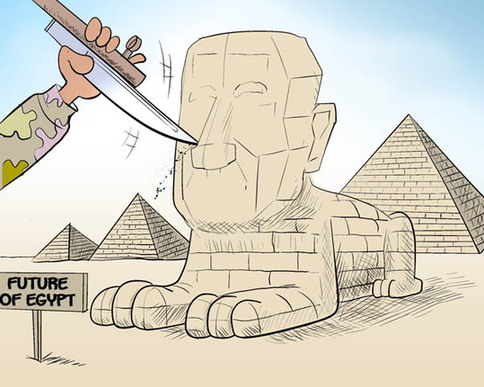No panacea for Egypt
- By Jin Liangxiang
 0 Comment(s)
0 Comment(s) Print
Print E-mail China.org.cn, August 16, 2013
E-mail China.org.cn, August 16, 2013
On August 14, Egypt's military launched a severe crackdown on the protestors of the Muslim Brotherhood, and declared a month-long state of emergency. Sources disagree on the number of people who have died so far, but the figure may run into the thousands.
|
|
|
On the chopping block [By Jiao Haiyang/China.org.cn] |
The so-called "Arab Spring"was another "democracy trap" for the Arabs. The latest developments in Egypt, from the ouster of Mohamed Morsi to the crackdown on Morsi's supporters, reflects profound domestic divisions in Egypt. It seems that there is no immediate panacea for Egypt's problem.
As in most other Arab countries, Egypt's society is divided into two tracks. Those living in the big cities like Cairo and the coastal areas are supporters of secular parties while the lower-class rural and city dwellers are much more conservative and traditional.
The two major political forces fought together to remove Hosni Mubarak from power two and a half years ago, and were the two major forces that requested the military to return their ruling power to the people, one and a half years ago. But despite sharing the same goals in the past, the two forces are very divided.
The secular factions were a major force in protesting against the rule of the Muslim Brotherhood, which provided an excuse for the intervention of the military. In the aftermath of the removal of Morsi, the political demonstrations led by the Muslim Brotherhood lasted until the crackdown by the military government on August 14. Those predicting the immediate reconciliation of the Muslim Brotherhood have certainly underestimated the depth of the divisions between the two factions.
It is possible that Egypt will have to return to election politics sooner or later, as the interim government claimed shortly after Morsi's removal. But regardless of which faction comes to presidential power, it would not be able to pacify the other side. It seems that neither faction would be tolerant,judging by the current conflicts between the two. What's more, after this latest round of clashes, dissatisfactions have been enhanced by hatred.
The special status of the army hinders Egypt's political transformation, which should cover all political factions, but unfortunately isn't so far. For historical reasons, the military is not only independent from the political system but also enjoys unchecked power over other political institutions, which is detrimental to political transformation.
As an elected president, Mohamed Morsi was legitimized by a constitution. If he took actions that undermined the interests of other factions, they could be corrected through normal constitutional channels.
Unfortunately, Morsi was removed unnaturally, which will produce negative effects on Egypt's transformation in both the short and long term. In the short term, since Morsi's deposition was not sufficiently legal, the Muslim Brotherhood launched violent demonstrations. In the long term, the general public will lose their confidence in achieving their interests through constitutional channels. Other political forces may be encouraged to achieve their political objectives through unorthodox channels.
Therefore, one of the biggest difficulties of Egypt's political transformation is how to include the military in the constitutional framework. Only in this way can the power of the military be checked. Such a framework is one of the preconditions for Egypt to step back onto the normal path of transformation. But it is unlikely that the military will give up their power, as they have enjoyed it for too long. Other forces do not have the resources to stop them.
Last but not least, foreign powers continually intervene in Egyptian politics. The army's decision to remove Morsi was probably not without at least tacit approval from the U.S. The army receives a large amount of aid from the U.S. every year. To be more precise, the U.S. and Egyptian army share the same interest in deposing Morsi.
While the Egyptian army oppose Morsi's religious policy, the U.S. is worried that Egypt, led by the Muslim Brotherhood, might become a part of new anti-American nexus in the region. The Muslim Brotherhood strongly backs Hamas, which is regarded by the U.S. as an obstacle to the Middle East peace process. The U.S. is currently pushing the peace process, and is not happy with Morsi's policy of improving relations with Iran, an arch enemy of the US.
Though a declining power in the Middle East, the U.S. still plays an influential role in the region. U.S. intervention has always been an obstacle of regular political transformations.
It is always easier to break up an existing order than to establish a new one. The world should be prepared for a chaotic Egypt for a rather long time.
The author is a columnist with China.org.cn. For more information please visit:
http://china.org.cn/opinion/jinliangxiang.htm
Opinion articles reflect the views of their authors, not necessarily those of China.org.cn.




 Add your comments...
Add your comments...

